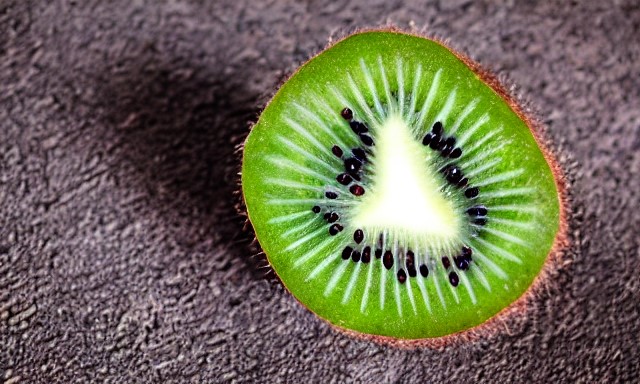Internet Asks: "Are Kiwi Acidic?"
Kiwi is a popular fruit known for its sweet and tart taste and green flesh with black seeds. It is a nutritious fruit, packed with vitamins, fiber, and antioxidants. If you're wondering whether kiwi is acidic, the answer is not straightforward, as it depends on various factors, such as the ripeness of the fruit and the variety. In this article, we'll delve into the acidity levels of kiwis and explore their potential benefits and drawbacks, backed by multiple reliable sources.
Sponsored Links
pH Level of Kiwis
The pH scale ranges from 0 to 14, with 0 being the most acidic and 14 being the most alkaline. Kiwis typically have a pH range of 3.1 to 3.96, which is considered acidic. However, the pH level can vary depending on several factors, including the level of ripeness, growing conditions, and storage conditions. Kiwis have a higher pH level than other fruits such as lemons (pH 2) and oranges (pH 3.6 to 4.34).

Types of Kiwi
There are several types of kiwi, including the most common one, the fuzzy kiwi (Actinidia deliciosa), which has a brown hairy exterior and a green interior with black seeds. The golden kiwi (Actinidia chinensis) is another type of kiwi with a smooth skin and a yellowish interior. The pH level of kiwi can vary depending on the ripeness and variety, but all types of kiwi are considered to be acidic fruits.
Effects of Kiwi on Acid Reflux
While kiwis are considered to be acidic, they are
actually alkaline-forming when consumed due to their high levels of minerals such as
potassium and magnesium. In fact, some studies have shown that consuming kiwis may help
reduce symptoms of acid reflux by neutralizing stomach acid.
However, if you have
acid reflux or other digestive issues, it's always best to consult with your doctor
before making any dietary changes.
Benefits of Kiwis
Kiwis are packed with nutrients and are considered to be a superfood due to their many health benefits. Some of the benefits of consuming kiwis include:
- - Aids Digestion: Kiwis are an excellent source of dietary fiber, which can help promote regularity and prevent constipation. Additionally, the enzymes found in kiwis, such as actinidin, can help break down proteins and improve digestion.
- - Boosts Immunity: Kiwis are rich in vitamin C, which is essential for a healthy immune system. One medium-sized kiwi contains around 71% of the recommended daily intake of vitamin C, making it an excellent way to boost your immunity and fight off infections.
- - Supports Heart Health: Kiwis are a good source of potassium, which is important for heart health. Potassium can help regulate blood pressure and lower the risk of stroke and heart disease.
- - May Improve Sleep Quality: Kiwis contain a compound called serotonin, which has been linked to better sleep quality. Some studies suggest that consuming kiwis before bedtime may help improve sleep duration and quality.
- - Promotes Skin Health: Kiwis are rich in antioxidants, which can help protect the skin against damage from environmental factors such as pollution and UV radiation. The high vitamin C content in kiwis may also support collagen production, which can help keep the skin looking firm and youthful.
Sponsored Links
Side Effects of Kiwis
While kiwis are generally considered safe to consume, some people may experience side effects. These may include:
- - Allergic Reactions: Kiwis can cause allergic reactions such as bloating and diarrhea in some people, especially those with a history of allergies to other fruits or latex.
- - Interference with Medications: Kiwis contain vitamin K, which can interfere with blood-thinning medications such as warfarin.
Conclusion
In conclusion, kiwis are considered to be acidic due to their low pH level. However, they are also alkaline-forming when consumed and may even help reduce symptoms of acid reflux. Kiwis are packed with nutrients and have many health benefits, but they may also cause side effects in some people. As with any dietary change, it is always recommended to consult with a healthcare professional before adding kiwis to your diet.
Sponsored Links
References
- 1. National Institutes of Health. (2021). Vitamin C. https://ods.od.nih.gov/factsheets/VitaminC-HealthProfessional/
- 2. U.S. Food and Drug Administration: Approximate pH of Foods and Food Products. (2007). https://www.healthycanning.com/wp-content/uploads/pH-FDAapproximatepHoffoodslacf-phs.pdf
- 3. United States Department of Agriculture. (2021). Kiwifruit, green, raw. https://fdc.nal.usda.gov/fdc-app.html#/food-details/168153/nutrients
- 4. WebMD LLC. Health Benefits of Kiwi. https://www.webmd.com/diet/health-benefits-kiwi
- 5. The Tart Tart,. Is kiwi Acidic? Is it good for You?. https:// www.thetarttart.com/health/is-kiwis-acidic/
- 6. Medical News Today. What are the health benefits of kiwifruit?. https://www.medicalnewstoday.com/articles/271232#benefits
- 7. Livestrong. Is Kiwi Fruit Alkaline?. https://www.livestrong.com/article/273399-how-many-calories-do-oranges-have/
Updated June 2024: Stay informed with the latest updates by checking back on our blog for more detailed and current information.
People are also reading...
🍉 Is Watermelon Acidic?
🫐 Are Blueberries Acidic?
🥭 Are Mangoes Acidic?
Ready to level-up?
Create meal plans 10x faster, follow up with your clients through our mobile app, and never struggle with meal planning or recipe management again.